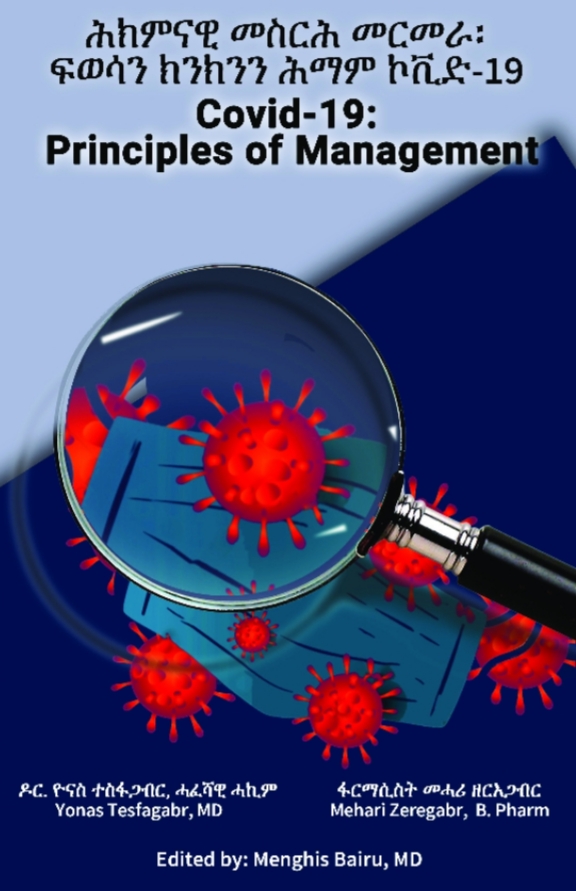BOOK DETAILS

COVID-19: Principles of Management
Author/Authors:
Dr.Yonas Tesfagabr
Pharm. Mehari Zeregabr
Page Count:
121
Description
COVID-19: Principles of Management
Inaccurate information spreads widely and at speed, making it difficult for the public to identify verified facts and advice from trusted sources.
This book offers a detailed evidence-based and up-to-date compilation of COVID-19 information. Written for Tigrigna speakers/readers health professionals, the book was designed as an interim guide for the clinical management of COVID-19. Furthermore, this book serves all Tigrigna speaking/readers interested in understanding the current health crises from a scientific point of view and to avoid the stress that comes from the misinformation and infodemics.
Since the start of the pandemic the scientific world has been able to unravel many facts about this disease. However still there are many facts to be discovered and even some earlier known facts have been subject to change as studies go on. As the world responds to the COVID-19 pandemic, we face the challenge of an overabundance of information related to the virus, some being false and potentially harmful.
Background
In December 2019, a cluster of pneumonia cases was reported in china which was found to have been caused by previously unknown virus. It was later revealed that the newly identified virus was from previously known group of viruses known as Corona Viruses and it was named Novel Corona Virus 2019 which was later renamed to SARS-CoV-2.
Corona Viruses (Lt: Crown) are large group of RNA viruses. There are different types of Corona viruses that can cause mainly respiratory and gastrointestinal diseases like common cold, SARS or MERS.
SARS CoV-2 was initially identified in Hubei-China, in a group people with pneumonia who had recently been associated with live animal market in the city of Wuhan. The disease was then transmitted to close contacts such as family members and health care workers.
The World Health Organization was notified of the outbreak on December 31, 2019. The cases continued to spread outside of the area and then across the world. COVID-19 was reported as a global health emergency by the end of January 2020. As the worldwide case numbers increased, the WHO declared on March 11, 2020, that COVID-19 had reached the pandemic stage.
Initially a lot was unknown about the virus and many of the assumptions were taken from the similarities with the earlier diseases like the SARS and MERS.
Epidemiology and virologic studies suggest that transmission mainly occurs from symptomatic people through respiratory droplets, direct contact with infected persons, or contaminated objects.
The incubation period for COVID-19, which is the time between exposure to the virus (becoming infected) and symptom onset, is on average 5–6 days, but can be up to 14 days.
While most people with COVID-19 develop only mild (40%) or moderate (40%) disease approximately 15% develop severe disease that requires oxygen support, and 5% have critical disease with complications such as respiratory failure, acute respiratory distress syndrome, sepsis and septic shock, thromboembolism, and/or multi-organ failure, including acute kidney injury and cardiac injury. Older age, smoking and underlying non-communicable diseases have been reported as risk factors for severe disease and death.
To date, there is no effective treatment but only supportive measures. Thus our greatest strategy against this virus is prevention. As it is true for most pandemics, the game changer strategy would be finding a safe and effective vaccine. Most pharmaceutical companies have been engaged in finding a vaccine and some have succeeded already. However, as vaccine production and distribution are very challenging, public health measures such as social distancing, hand washing and wearing mask will still be as important.
Both Authors (Yonas Tesfagabr, MD and Mehari Zeregabr, BPharm) are young Eritrean Health Professionals committed to serving their community to the highest capacity.
About the Authors

Dr. Yonas Tesfagabr
Dr. Yonas Tesfagabr is
among the highly valued young medical doctors
from Eritrea with exp erience in medicine for more
than five years. He graduated from the Orotta
School of Medicine and Dentistry, class of 2015, with
a degree in Doctor of Medicine.
Dr. Yonas is greatly appreciated for his contributions
to th e Eritrean community while serving under the
Ministry of Health in Eritrea. In addition to his clinical
practice, Dr. Yonas was greatly engaged in projects
to enhance health awareness among communities;
leading and participating in many health seminars,
workshops, and on-the-job training sessions. During
his employment as a general practitioner at
Mend efera Zonal Referral Hospital, Dr. Yonas also
served as the focal person to pharmacovigilance and
an active memb er of th e AEFI (Adv erse Ev ent
Following Immunization) investigative committee in
the southern zone.

Mehari Zeregabr
Mehari Zeregabr is
a Pharmacist with a plethora of experience in the
Pharmaceutical industry, Clinical Therapeutics
(mainly HIV/AIDS), and Pharmacovigilance. He
graduated from th e College of H ealth Sciences at the
University of Asmara in 2008 with a Bachelor’s
degree in Pharmacy (BPharm).
He presented sev eral scientific papers during
national conferences and co-published seven
scientific articles in international journals during his
service as a Pharmacovigilance officer in the
National Medicines and Food Administration (NMFA,
MoH). In recognition of the r elentless efforts he
made while working as an ARV-OPD-Pharmacist in
Halibet National Referral Hospital, Mr. M ehari was
awarded “Pharmacovigilante-2014 champion” for
the ICSR (Individual Safety Case Report) submitted to
the NMFA.

